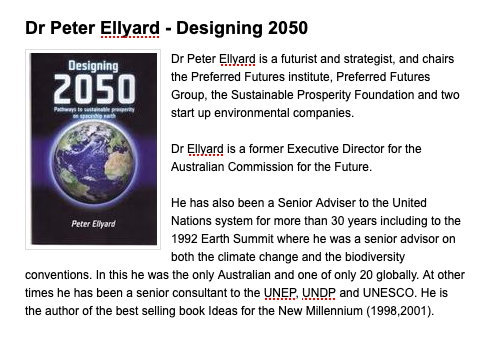Dr Peter Ellyard, head of Australia's former Commission for the Future.
Language and Global Communication
Language is a huge cause of misunderstanding. In 1955 the English-speaking world was shocked when Nikita Khrushchev, leader of the then Union of Soviet Socialist Republics (USSR) apparently declared ‘We will bury you’ in a speech to the United Nations in New York. It was a translator’s mistake. Khrushchev actually said, ‘We will outlive you’. At present, governments spend large sums of money to enable the world to communicate effectively. In 1996 the cost for the European Parliament of every published word was 36 cents (US), and is presumably more today because the European parliament allows the use of many more languages. The expense is due to the cost of translation and transcription services. As more nations join the EU the situation will become worse if each nation insists, as is likely, on speaking its own language in the European Parliament. If it is difficult with the present number of EU members what will it be like with twice this number? Ten new member nations joined the EU in 2004, with others to follow. Despite this high cost, the quality of communication is very poor. In international organizations such as the United Nations many delegates are disadvantaged in critical negotiations because they must express themselves in one of the six official languages of the United Nations. The pressure to add more languages will grow, particularly if Japan and Germany are elected to permanent membership of the Security Council as part of the reorganization of the United Nations system. Even in the late 1980s translation and transcription used 7% of the UN budget. Even in the late 1980s translation and transcription used 7% of the UN budget. It requires 400 hours of expensive translators’ labor to translate a one-hour speech in English into the other five official languages of Russian , French, Arabic, Spanish and Chinese. The translations have to be very carefully done, because a single mistake like the one made in Khrushchev’s speech could cause an international incident. The difficulties of training and finding translators are going to increase exponentially. Imagine the European Parliament with a Hungarian or Slovenian speaking and expecting this speech to be simultaneously translated into Italian, Swedish, Lithuanian, Polish and so on: a linguistic organizational nightmare! How many people would be fluent enough in both (say) Hungarian and Portuguese to translate simultaneously both ways? Imagine what fees they could demand for their services! Translations of documents require frustratingly long waiting periods, and those who suffer these frustrations are, in reality, privileged people in terms of their communication skills. Their proficiency in languages is very high by most standards, and they usually have the support of language specialists. But the support of language specialists is not available to most people. Ordinary people who travel face the language problem every day. Consider, for example, communication between doctors and patients in a country where the language is not known by the visiting patient, or by newly arrived migrants who do not know the language of their new home. As global interdependence, trade and travel increase, these problems get worse every year. They are regarded as a normal and unavoidable consequence of trade and travel, but are they unavoidable? Any rational person would come to the conclusion that the birth of a planetary culture requires the adoption of a planetary language. |
Language and Global Communication, Choices
The choice the world needs to make is whether this should be an existing national language which is given a new job to do or a new language designed specifically for the purpose.
For a question of such immense proportion, it is worth investing in a bit of thinking about the thinking called for. As Edward de Bono observed: Most bad thinking is not failure of logic, but of breadth. So, pause to consider “who has a choice?” and “how does, and should, the world make choices?”
There are many who believe that the world has already ‘decided’ that the international lingua franca should be (or will be) English. English is favored as the priority language for people to learn if they want to be effective on the international stage. There is no doubt that this situation is a consequence of US political and cultural power in the 20th century, and before this the imperial power of the UK in the 19th century.
But is that the model of decision-making our space-ship Earth should use?
Most citizens of wealthy English-speaking countries pay taxes for the common good, support worthy causes (at least occasionally) and (at least nominally) subscribe to the belief that it is right to aid the disadvantaged. Perhaps they can, and will, see that the global language decision should not be claimed by commercial interests, or by the exercise of inherited privilege, but by a more equitable consideration of the consequences to all stake-holders.
If they do, they may recognize that this question impacts on every single person in the world, and even future persons not yet born. Taking this into account, the proportion of the current and future Earthlings who already speak English goes from being a minority, to being a tiny fraction of the total stakeholders. The significant statistic becomes the difference in learning time, for English and the alternative, for the vast majority who have neither.
English is a notoriously difficult language to learn and most people who try to learn it fail. English is so difficult that it will only ever be an elite language , just as it remains an elite language in India after more than 100 years of language instruction in Indian Schools.
The recent market penetration of English has been huge. However will this (and should this) continue as India and China emerge as powerful nations in the 21st century, and an integrated Europe and resurgent Russia regain some of their former influence?
It is not sensible to make choices about global language policy to reflect temporary political power realities. Instead it should be based on more rational criteria such as ease and cost of learning, and whether any cultural imperialism would accompany its widespread use.
Esperanto has been a living language for about a hundred years since it was designed as an international language that would promote the development of internationalist values. Ludovic Zamenhof spoke twelve languages and combined the most useful elements of each to design a politically neutral language of remarkable economy and flexibility. The American linguist Mario Pei says, of Esperanto, ‘it is an artificial language just as a motor vehicle is an artificial horse’. Esperanto has a mixture of linguistic roots derived from Romantic, Germanic and Slavic languages so it will be widely accepted as a trans-European language. Some of its strongest adherents are Esperanto clubs in Poland, Hungary and Bulgaria, so the accession of eastern European countries into the EC will improve its visibility across Europe. Interestingly, China and the Republic of Korea have strong Esperanto movements and these cultures find Esperanto very easy to learn. Most people can use it effectively after studying it for six months to a year.
Many people involved in languages perceive Esperanto either as a threat to national linguistic cultures or as a language of no culture. In fact it is a language for a now emerging planetary culture; Zamenhof was a visionary a hundred years ahead of his time. Esperanto has survived through the intolerant and culturally imperialistic modernist era intact and can be now looked at afresh as a possible lingua franca for the emerging 21st century global society. Esperanto does not threaten any tribal culture as would English or another national language as an international lingua franca. Esperanto solves in a practical, low cost and culturally non-threatening way the problem of international or universal communication. In late 2003 a meeting in the EU considered the possible role which Esperanto might play in the future of Europe. It is possible that in the not too distant future Esperanto will be added to the official languages of the European Parliament.
After that all international conferences would be held in this language, as some (with thousands of participants from all continents are, already) with very few expensive translators in sight! Each cultural group would discuss things in its own language, but when they come together with other cultural groups they would use a language which is both everybody’s and nobody’s language. It would be a little like monetary union in the EU but on a much grander scale.
Future Taking/ Future Making
When the state of Israel was established, Hebrew was chosen as the language of the new state, and it is now at the centre of Jewish culture there. At that time Hebrew was a language spoken fluently by very few Jews even though almost all of them knew some Hebrew. All immigrants arriving in Israel were required to become fully fluent in Hebrew so that they could participate effectively in Israeli society, and through this all were put on an equal footing. Had one of the other national languages spoken by these immigrants been chosen instead, some migrants would have been advantaged against all the rest. The choice to use Hebrew and to require all would-be Israeli citizens to learn it was an act which consolidated their nation building and created an astonishingly cohesive society in Israel within a generation, because it de-emphasized difference and emphasized unity and cohesiveness.
The world now faces a choice similar to that made by the founders of the state of Israel. If Esperanto was everyone’s second language we would be better off because we would be placing everybody on an equal footing, avoiding any cultural imperialism, and so enhancing global cohesiveness.
It would not have been hard to find opponents to the introduction of Hebrew in Israel, to find those who said it was too hard, not their problem, something that would solve itself. Nevertheless, some people found the resolve to make a future.
We could do that too.
Dr Peter Ellyard is a futurist, strategist and a leading international conference speaker. He is a graduate of Sydney University (BSc.Agr) and of Cornell University (MS , Ph.D). He is currently Chairman of the Preferred Futures Institute and the Preferred Futures Group, which he founded in 1991. He also Chairs the Sustainable Prosperity Foundation. Dr Ellyard is a highly experienced executive. He is the former Executive Director for the Australian Commission for the Future.
For more about Dr Ellyard, click here
022

